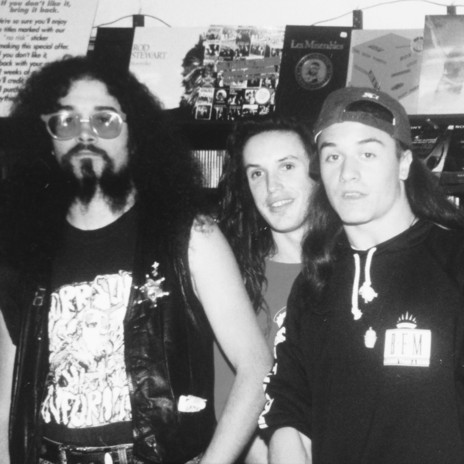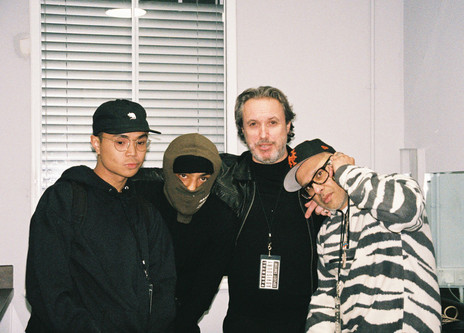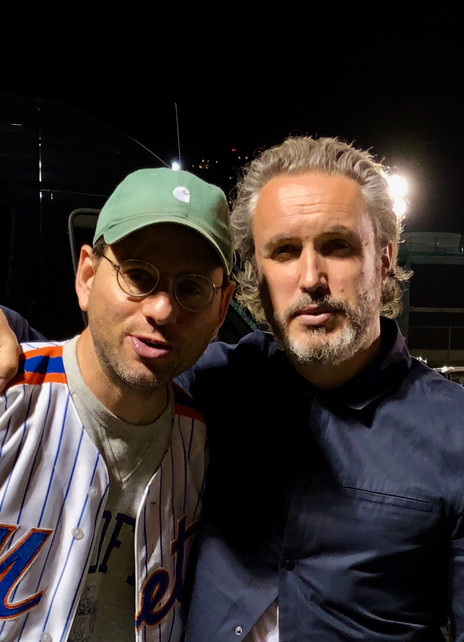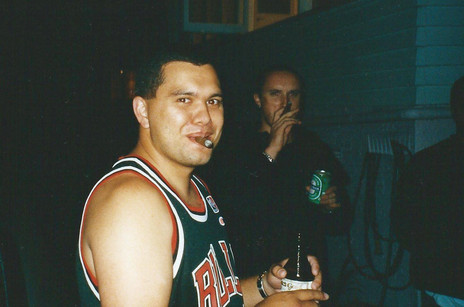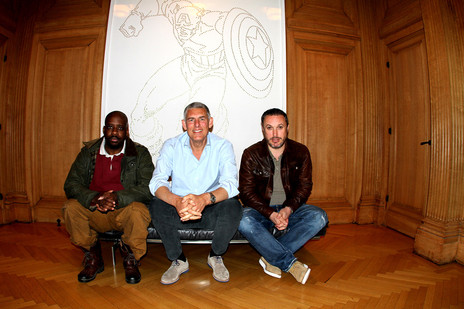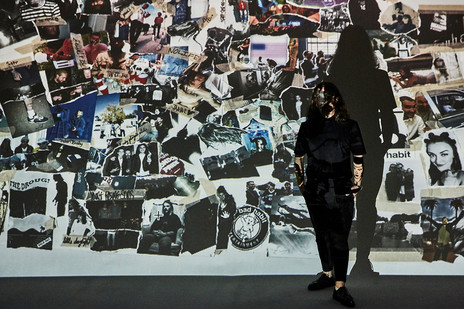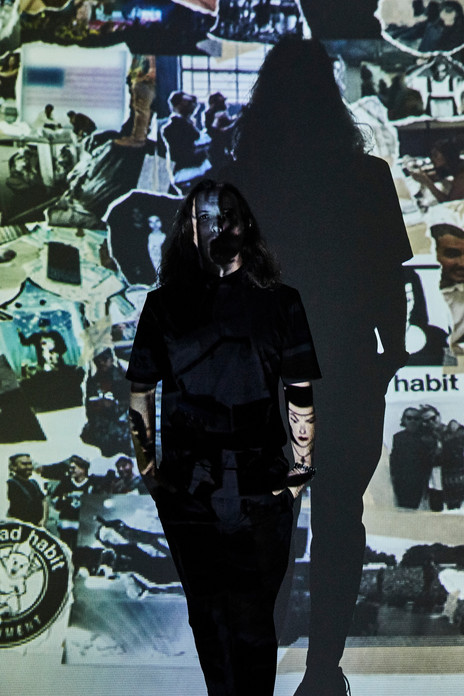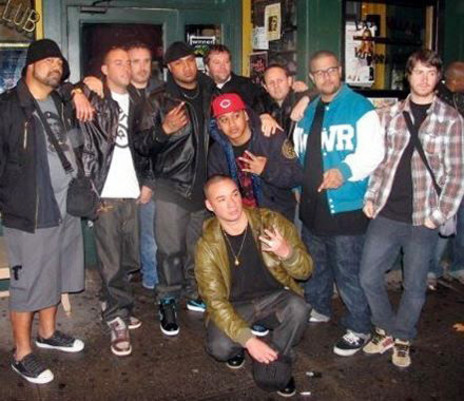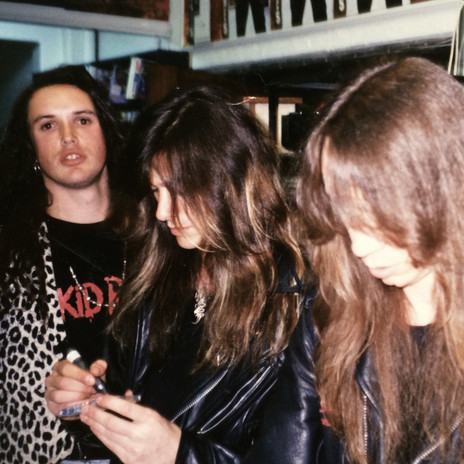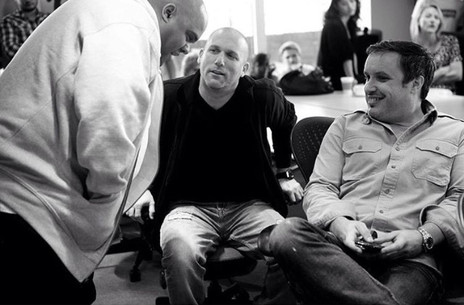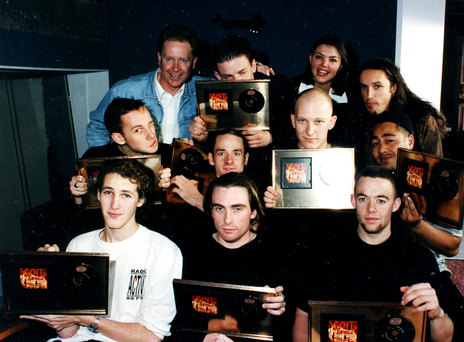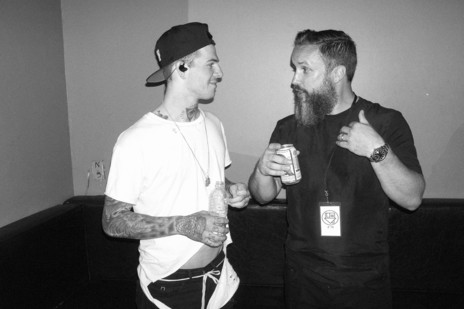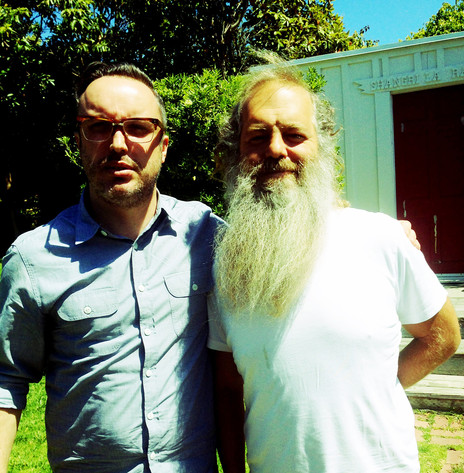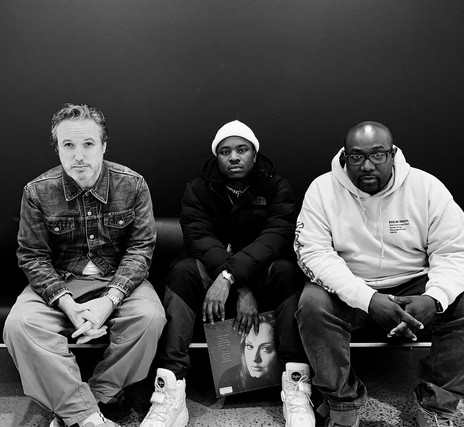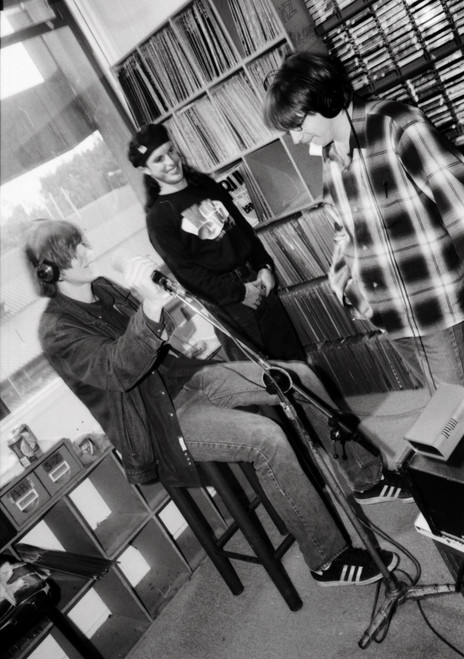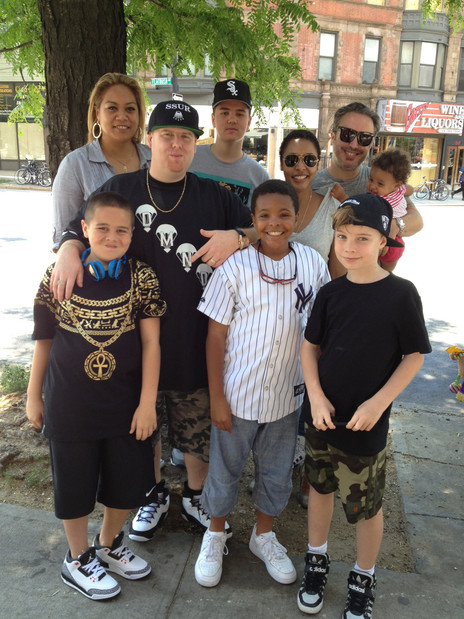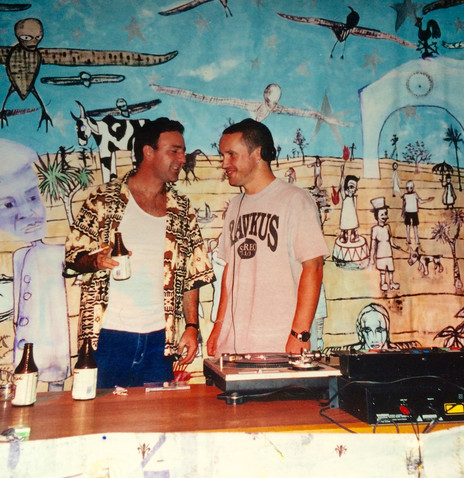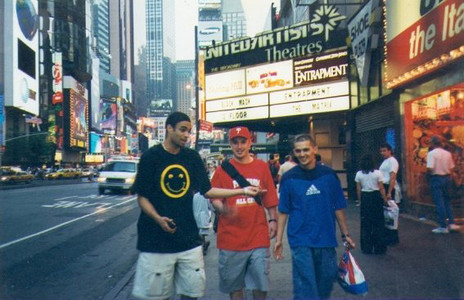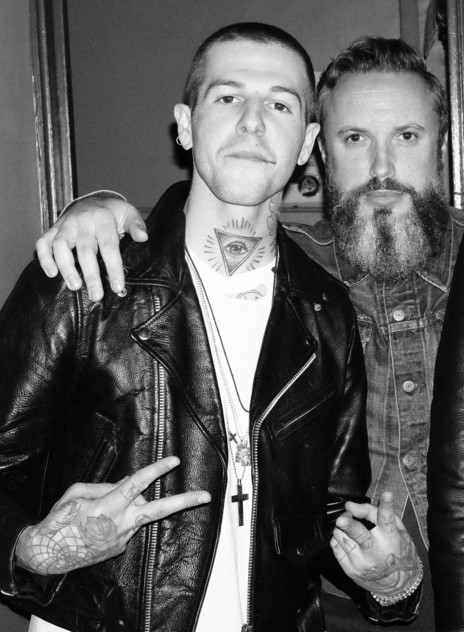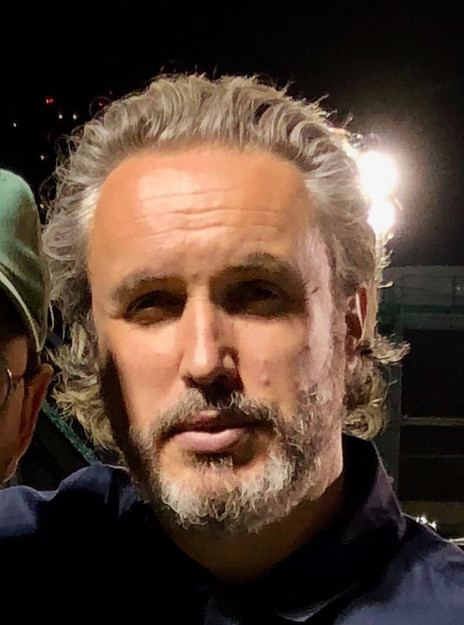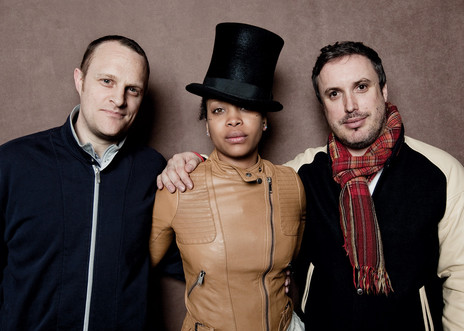By this stage, Morgan was working at Sounds in Manukau alongside another young music fan, Phil Bell aka Sir-Vere, who remembers how the store became a haven for their budding musical obsessions:
“Me and Base worked together there – Robin Paretene. Our part-timer was Kirk Harding. He was a real metal head. He had long hair and cowboy boots. I was into metal too, but he looked like he was in Guns N’ Roses. But he also liked hip hop too. We were all on the same wavelength.”
At the time, there were two different waves of music catching their interest. First was the indie music of The Smiths and Factory Record releases such as Joy Division and New Order. Second, the arrival of hip hop, with Public Enemy, Run DMC, and the Beastie Boys creating a new level of excitement. Though locally the most popular items were R&B tapes and 12”s from Bobby Brown, New Edition, Guy, Keith Sweat and Prince.
On Thursday nights the Sounds record store in Manukau took on a party atmosphere as the new releases blasted out.
The store’s new stock would be put out on Thursday night and the record store took on a party atmosphere, as they blasted out any new releases through the store speakers. Things did occasionally get out of control, with customers physically tussling over new stock and on one occasion, smashing a hole in the front counter. Following that, a security guard was hired for Thursday nights each week.
In 1992, Harding moved from Sounds to Marbecks Records, becoming one of the main buyers and setting up their new store on Queen Street. At the same time, he also DJ’d on bFM, hosting the Totally Wired show (new music and jazz), as well as Tranquility Bass (showcasing electronic music).
BMG years
Around this time, Harding began to notice that talented hip hop and R&B acts were beginning to appear on the local scene, many of them released through young label Deepgrooves.
“They were just releasing music that I was buying and listening to at home. I was always a big fan of Flying Nun and several New Zealand music acts, but I connected to the fact that Deepgrooves was releasing music by young Māori and Polynesian acts – that was progressive for its time. Having grown up in a largely Polynesian environment, I connected with it on another level. The music also felt truly competitive on the global stage.”
In contrast, Festival Records (Australia) was the only one of the major labels that seemed to have any interest in signing young local acts. Harding figured that if he could get involved with one of the majors, he could try to open the door to the burgeoning talent in the scene. His first step was moving from Marbecks to a job at BMG.
“My entry-level position at BMG was in promotions. Three months into the job as a promo guy I walked Supergroove into Morrie Smith [BMG’s managing director] and asked if we could sign them. He agreed providing that I do all the work on them.”
Three months after starting at BMG, Harding suggested the label signed Supergroove.
Harding had met the group’s manager, Stuart Broughton, when he had come into Sounds to put up the band’s posters. It was Broughton that convinced Harding to attend one of their all-ages shows at the Ellen Melville Hall off High Street, which blew Harding away.
“I never would’ve known about them without Stuart. When I turned up at the show, it was like they’d created their own world. They had an onstage uniform, a great logo above the stage, a young sound guy who was their age and Urban Disturbance were supporting them on the night. I’d never seen a local act with their look, sound and aesthetic so dialled in at that age. They had a vision and Stuart was a huge part of that.”
Each successive single by Supergroove reached higher in the charts, with ‘Can’t Get Enough’ finally claiming the top spot. The resulting album, Traction (1994), shipped platinum in its first week.
Harding’s work with Supergroove had also led him to work with local DJ/producer DLT.
“Stinky Jim is a close friend and we had a radio show together at the time. I was looking to remix Supergroove’s ‘Sitting Inside My Head’ and Jim suggested DLT. We met and I was impressed with the music that he was already holding, which included Joint Force’s EP. I signed Darryl and we set out to release some music ahead of his debut album in order to give him some recent history among local press etc. Following on from the success of the remix of ‘Sitting Inside My Head’ we concocted the idea to release two EPs ahead of the album, the Joint Force EP and a Supergroove remix EP.”
Joint Force was a group that saw DLT working alongside Mark James and Otis Frizzell (previously a party-rap act as MC OJ and Rhythm Slave) and their EP, One Inch Punch, hit No.21 in June 1995. Moving from this to a solo album by DLT was a bit of a gamble since the idea of a producer’s album was entirely new to the local scene. What helped the gambit pay off was when DLT arranged to do a single with ex-Supergroove singer Che Ness, aka Che Fu.
Harding knew it had the potential to be a hit, so pushed for multiple versions of the track to be done until he was satisfied with it. However, he was still startled by how it went – not only did ‘Chains’ stay at No.1 for six weeks, but it also connected deeply with audiences and helped push DLT’s album True School (1996) to No.12. BMG was also growing its roster of NZ talent more generally, with Harding signing indie rock group Semi Lemon Kola/Propeller and Morrie Smith arranging for BMG to work with Wildside Records and Tangata Records.
By this stage, Harding’s record store friend Phil Bell/Sir-Vere was also working at BMG and had the task of bringing new exciting acts to him. It was Bell who presented Harding with the Urban Pacifika project that was being run by South Auckland producer Phil Fuemana.
Harding was already aware of the previous records Fuemana had put out through Southside and Deepgrooves (as “House Party” and “Fuemana”) as well as Fuemana’s contributions to producer Alan Jansson's Proud compilation, which saw a Jansson produced Top 20 single by Sisters Underground and helped open the door to his younger brother Pauly Fuemana (as OMC)'s worldwide success later in the decade.
They had a meeting where Phil Fuemana brought them a CD of six tracks by the acts he was working with, including R&B act Moizna and rappers Lost Tribe. Harding was blown away and arranged for BMG to release the eventual album, Pioneers of the Pacifikan Frontier (1999). A number of the acts on the album also put singles into the Top 20: Moizna, Lost Tribe and AKA Brown.
It was a shock when both Harding and Sir-Vere announced they were leaving BMG.
In 1998, Harding was accepted to study law at the University of Auckland (using recommendation letters from industry figures Campbell Smith and Malcolm Black to skip the usual requirements), while continuing to hold down his job as A&R at BMG. Meanwhile, his successes had been noticed by BMG’s upper management, who had just rolled out a “Promising Young Executive” programme. Harding ended up being the first to be picked for this scheme, which saw him spending time working in BMG’s New York and London offices.
It, therefore, came as a shock when both Harding and Sir-Vere announced that they would be leaving BMG. In Sir-Vere’s case, it was the pressures of being a new father that led him to the decision, while Harding had simply received a better offer.
“I had received several job offers in New York, LA and Australia prior to receiving the job offer at Loud Records. The difference at that time was that Morrie had just been forced to retire and I was not a fan of the incoming administration. I reached out to some colleagues in the US to let them know that I was now interested in moving abroad and ended up with interviews at Loud Records and LaFace. I chose to roll with Loud Records because they were based in New York. LaFace was in Atlanta.”
New York
The owner of Loud Records, Steve Rifkind, was just a teen when he first started working at the label his dad ran, Spring Records (an R&B label that coincidentally released the first rap single ever – ‘King Tim III’ by the Fatback Band in 1979). Rifkin started Loud in 1991 and, for a hip hop fan like Harding, the offer to work with him was just too good to refuse, So, in in 1999, Harding signed on as the label’s VP of International Marketing.
“When I joined Loud, they were poised to become the new Def Jam Records. Def Jam had stumbled as they transitioned from Columbia to PolyGram. Columbia/CBS were looking for a new label to fill that void and Loud was on fire at that time with recent releases from Wu Tang Clan, Big Pun, Mobb Deep and others. I joined the label during the transition to Columbia. Steve was barely in the office at the time and spent most of his time on the road with a lot of the artists or in LA. It was before the full impact of downloading had hit the music industry, so there was a lot of money and optimism in the industry.
“Working in New York for one of the premier hip hop labels was an amazing introduction to the city.”
“Working in New York for one of the premier hip hop labels at that time was an amazing introduction to the city. My business card opened a lot of doors. It coincided with the rise of Hot 97 and also hip hop club culture in the city and we were always at industry parties, the Tunnel or Club Speed where a lot of legendary cultural moments went down. I also found myself travelling the globe with our acts on a regular basis: Dead Prez, The X-ecutioners, The Beatnuts, Tha Liks, M.O.P and Xzibit were all travelling a lot during that time. I worked alongside a young DJ Semtex at Sony in the UK, who was running their club and street team department and together we broke several artists.”
Sony eventually bought a 60 percent share in Loud and this sometimes made things difficult (as in 2001, when orders from Sony head office meant that 27 of the 80 Loud staff had to be released). But Harding thrived, eventually being promoted to VP of Marketing and running US campaigns for Dead Prez, Beatnuts, and X-Ecutioners. He also worked on projects that were released through Loud’s subsidiary labels Violator Records and Stimulated Records.
Harding also provided a conduit for some of these acts to connect with an audience back in New Zealand, for example, by bringing Tha Liks down to perform at the 2001 Aotearoa Hip Hop Summit. When Dawn Raid wanted to record Mareko in New York, Harding helped them connect with respected producers and MCs associated with Loud Records, most notably Beatnuts and Inspectah Decks from Wu Tang. He also arranged for tracks by Dead Prez, J-Ro (from Tha Liks) and Beatnuts to appear on a mixtape that was released alongside Mareko’s album.
When Loud Records was finally bought out by Sony in 2002, Harding was left without a job. He did have an offer from Columbia Records in the meantime, but instead waited six months for Rifkind to start up with a new company – SRC aka Street Records Corporation (which intentionally had the same initials as Rifkind’s father’s label, Spring Records Corporation). Rifkind arranged the label as a partnership with Universal Motown Records and brought Harding on as exec VP.
Harding enabled a hook-up between Savage and US artist Akon for ‘Moonshine’, which hit No.1
One of SRC’s biggest acts in those early years was Akon and once again Harding provided a hook-up to the local scene, leading to the track ‘Moonshine’ by Savage (featuring Akon) hitting No.1 in New Zealand and also reaching the Top 10 in Australia. The music video for the track was filmed in New York, so Akon could appear in it alongside Savage.
Move the Crowd
Kirk Harding was brought further back into the local scene after having New Zealand music producer Justin “Juse” Ferguson stay on his couch in New York. Juse had a long history in Auckland as a DJ and was part of the Token Village crew that provided a crucial nurturing ground for acts like Che Fu and King Kapisi, via their club sets at Auckland nightclub Cause Celebre. By 2004, Juse was travelling the world to record acts for his own producer’s album.
“We linked via Stinky Jim. I had met Juse a few times back in his Token Village days via Che Fu, but I didn’t really know him. His debut album was originally going to be released on Round Trip Mars and Jim asked me to help out.”
Harding was so impressed with the recordings Juse had made with local rapper, Tyree, that he set-up a new label with Juse and his partner Aaron Christie at recording/publishing company Woodcut Productions.
“MTC” (Move The Crowd) released its first two albums in 2006: Tyree’s album Now or Never (2006), which spawned a minor hit (‘Ladies and Gentlemen’ hit No.21) and Juse’s album, Global Casino (2006). The next release pushed things further forward – Young Sid’s album, The Truth (2007) was not only critically acclaimed but reached the Top 40 (lead single ‘Stuck In A Box feat Stan Walker’ also entered the Top 20).
The slow-building success of Young Sid and Tyree was part of a bigger plan. Both rappers were part of a trio, Smashproof, along with the equally talented Deach, so their solo albums sought to create a street-level buzz around these individual members, while they also released a slew of mixtapes.
The tactic was remarkably effective, especially when the first single by Smashproof saw them working alongside rising star Gin Wigmore; the collaboration came about at the suggestion of Adam Holt and Jess Peters from Universal NZ (which had recently signed Wigmore and was distributing many of the MTC releases). Tyree already had written the chorus but Wigmore ended up fitting the song perfectly.
The resulting track, ‘Brother,’ held the No.1 on the charts for 13 weeks, breaking several records. Two more Smashproof singles hit the Top 20 and the album, The Weekend (2009), reached No.3. MTC went on to work with other rap acts such as Dirty Sesh, Ethical, and Kidz In Space (which brought together Ethical with Josh Fountain, who went on to become an in-demand producer and member of pop act Leisure).
One approach took to developing the skills of acts on his roster was to get them over to the US to record. As a result, Young Sid, Tyree, Juse, Dirty Sesh and Ethical all spent time in New York making music.
In New York, Harding remained open to helping out other acts in the New Zealand hip hop scene.
Harding also remained open to helping out other acts in the New Zealand hip hop scene. His old friend Sir-Vere had created a successful run of DJ mix compilations under the name Major Flavours, which also expanded into Australia. Harding arranged shout-outs by famous acts and hook-ups for licensing songs for these releases.
When Sir-Vere needed to create a track to promote his first Australian version of the Major Flavours compilation, Harding introduced him to Emile Haynie, who had already worked with Ghostface Killah and Eminem (and would later work with Kanye West, Kid Cudi, Lana del Rey and Florence & The Machine). The resulting track helped boost Sir-Vere’s release to the top of the Australian compilation charts. Haynie also produced beats for the Young Sid and Ethical albums. When P-Money moved to New York, he also gained crucial connections through Harding, which helped him find people to work with in the local scene.
Universal-Motown and beyond
While Harding’s work with MTC was going on, his US career was still in full swing. In 2005, he became Senior Vice President, International Marketing & A&R for Universal Motown Republic Group. This meant Harding made key decisions on whether or not acts on the label should take their music into Europe, the UK, or any other market across the world. One important achievement while at Universal Motown was signing Kid Cudi (alongside Nigil Mack).
This high-profile role went through until 2011, when Harding decided to strike out on his own by forming his own management company, Bad Habit Management.
In his early years in management, he worked with two New Zealand acts based in the US: singer Janine (aka Janine and the Mixtape) and Justyn Pilbrow (former Elemeno P guitarist turned producer). It was the connection with Pilbrow that would turn out to the most long-lasting after Harding brought him together with pop/rock group, The Neighbourhood and he went on to produce their first two albums. Their debut album, I Love You (2013) was certified gold in the US and spawned the mega-hit, ‘Sweater Weather’ which went double-platinum and had 388 million streams on Spotify alone.
Harding has come a long way from the Sounds record store in Manukau.
He continues to represent The Neighbourhood and also a number of other multi-platinum recording artists spread across a wide range of genres, including rapper IDK and pop singer Ryan Beatty. In 2016, Harding worked with Atlantic Records/Warner Music Group to start up a new label, Bad Habit Music (while simultaneously creating a publishing wing under the same name, with Sony ATV). His first major signing at the new label is Afrobeat superstar Burna Boy.
Harding has come a long way from that record store in Manukau and is regarded as one of New Zealand’s biggest hip hop success stories. That he’s been willing to provide a leg up along the way has proved to be a lucky break for many New Zealand artists.
